Last Updated on July 9, 2023
CoffeeScript is a very succinct programming language that transcompiles into JavaScript, so there is no interpretation at runtime. The syntax is inspired by Ruby, Python and Haskell, and implements many features from these three languages.
CoffeeScript is closely related to JavaScript without having its eccentricities. However, CoffeeScript offers more than fixing many of the oddities of JavaScript, as it has some useful features including array comprehensions, prototype aliases and classes. It allows developers to write less code to get more done.
CoffeeScript is a new language, first appearing in 2009. The first stable release shortly followed in December 2010.
The focus of this article is to select the finest CoffeeScript books which help programmers become proficient coding in this language. The books selected help developers to take full advantage of the power of CoffeeScript. All of the books are published under open source licenses.
1. The Little Book on CoffeeScript by Alex MacCaw
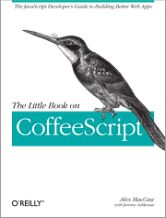 The Little Book on CoffeeScript is an excellent introductory text to CoffeeScript programming. The books shows JavaScript developers how to build web applications with CoffeeScript.
The Little Book on CoffeeScript is an excellent introductory text to CoffeeScript programming. The books shows JavaScript developers how to build web applications with CoffeeScript.
This book is designed to help you learn CoffeeScript, understand best practices and start building awesome client side applications. The book is a concise guide spanning only 5 chapters.
Through example code, this guide demonstrates how CoffeeScript abstracts JavaScript, providing syntactical sugar and preventing many common errors. You’ll learn CoffeeScript’s syntax and idioms step by step, from basic variables and functions to complex comprehensions and classes. The book also offers an introduction to structuring and creating your own CoffeeScript applications.
There’s an updated version of the book available to purchase in paperback, as well as PDF and Kindle version.
Read the free electronic version at https://arcturo.github.io/library/coffeescript/. This book is completely open source.
2. CoffeeScript Cookbook by David Brady, John Ford, Steven Reid, and many others
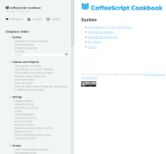
CoffeeScript Cookbook is a community run website for the CoffeeScript language.
CoffeeScript Cookbook offers a wealth of information on CoffeeScript covering areas such as the language’s syntax, classes and objects, strings, arrays, dates and times, math, functions, metaprogramming, jQuery, Ajax, regular expressions, networking, design patterns, databases, and testing.
Read the book at https://coffeescript-cookbook.github.io/.
The project’s GitHub repository is here. All contributions are licensed under the Creative Commons Attribution 3.0 Unported (CC BY 3.0) license.
3. Smooth CoffeeScript
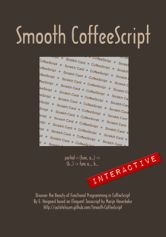 Smooth CoffeeScript is a book about CoffeeScript and programming. Start with programming fundamentals, learn about functional programming with Underscore and problem solving, study object orientation and modularity. It covers client/server web apps with Canvas and WebSockets.
Smooth CoffeeScript is a book about CoffeeScript and programming. Start with programming fundamentals, learn about functional programming with Underscore and problem solving, study object orientation and modularity. It covers client/server web apps with Canvas and WebSockets.
No previous programming knowledge is required. CoffeeScript lets you write web oriented applications simply and elegantly. It is closely related to JavaScript but without its quirky corners.
This book is also published under the Creative Commons Attribution 3.0 Unported (CC BY 3.0) license.
Read the book at https://autotelicum.github.io/Smooth-CoffeeScript/.
4. Hard Rock CoffeeScript by
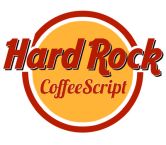 Hard Rock CoffeeScript is an introductory text to the world of CoffeeScript. Along the way, you’ll learn about the syntax of the language, classes, and design patterns.
Hard Rock CoffeeScript is an introductory text to the world of CoffeeScript. Along the way, you’ll learn about the syntax of the language, classes, and design patterns.
According to the project’s GitHub page, the book is published under the MIT license.
Read the book at https://alchaplinsky.github.io/hard-rock-coffeescript/.
5. CoffeeScript Ristretto by Reg “raganwald” Braithwaite
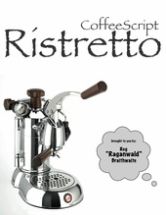 CoffeeScript Ristretto is a book about programming with functions that uses the CoffeeScript programming language for the examples and exercises.
CoffeeScript Ristretto is a book about programming with functions that uses the CoffeeScript programming language for the examples and exercises.
The book’s main focus is functions as first-class values and advanced topics built on those fundamentals such as callbacks, combinators, method decorators, fluent APIs, and continuation-passing style. The book dives into CoffeeScript’s semantics from simple functions up through closures, higher-order functions, objects, classes, combinators, and decorators.
The book is not released under an open source license. But you can read it without charge. It has a suggested price of $7.99.
Read the book at https://leanpub.com/coffeescript-ristretto/.
All books in this series:
| Free Programming Books | |
|---|---|
| Ada | ALGOL-like programming language, extended from Pascal and other languages |
| Agda | Dependently typed functional language based on intuitionistic Type Theory |
| Arduino | Inexpensive, flexible, open source microcontroller platform |
| Assembly | As close to writing machine code without writing in pure hexadecimal |
| Awk | Versatile language designed for pattern scanning and processing language |
| Bash | Shell and command language; popular both as a shell and a scripting language |
| BASIC | Beginner’s All-purpose Symbolic Instruction Code |
| C | General-purpose, procedural, portable, high-level language |
| C++ | General-purpose, portable, free-form, multi-paradigm language |
| C# | Combines the power and flexibility of C++ with the simplicity of Visual Basic |
| Clojure | Dialect of the Lisp programming language |
| ClojureScript | Compiler for Clojure that targets JavaScript |
| COBOL | Common Business-Oriented Language |
| CoffeeScript | Transcompiles into JavaScript inspired by Ruby, Python and Haskell |
| Coq | Dependently typed language similar to Agda, Idris, F* and others |
| Crystal | General-purpose, concurrent, multi-paradigm, object-oriented language |
| CSS | CSS (Cascading Style Sheets) specifies a web page’s appearance |
| D | General-purpose systems programming language with a C-like syntax |
| Dart | Client-optimized language for fast apps on multiple platforms |
| Dylan | Multi-paradigm language supporting functional and object-oriented coding |
| ECMAScript | Best known as the language embedded in web browsers |
| Eiffel | Object-oriented language designed by Bertrand Meyer |
| Elixir | Relatively new functional language running on the Erlang virtual machine |
| Erlang | General-purpose, concurrent, declarative, functional language |
| F# | Uses functional, imperative, and object-oriented programming methods |
| Factor | Dynamic stack-based programming language |
| Forth | Imperative stack-based programming language |
| Fortran | The first high-level language, using the first compiler |
| Go | Compiled, statically typed programming language |
| Groovy | Powerful, optionally typed and dynamic language |
| Haskell | Standardized, general-purpose, polymorphically, statically typed language |
| HTML | HyperText Markup Language |
| Icon | Wide variety of features for processing and presenting symbolic data |
| J | Array programming language based primarily on APL |
| Java | General-purpose, concurrent, class-based, object-oriented, high-level language |
| JavaScript | Interpreted, prototype-based, scripting language |
| Julia | High-level, high-performance language for technical computing |
| Kotlin | More modern version of Java |
| LabVIEW | Designed to enable domain experts to build power systems quickly |
| LaTeX | Professional document preparation system and document markup language |
| Lisp | Unique features - excellent to study programming constructs |
| Logo | Dialect of Lisp that features interactivity, modularity, extensibility |
| Lua | Designed as an embeddable scripting language |
| Markdown | Plain text formatting syntax designed to be easy-to-read and easy-to-write |
| Objective-C | Object-oriented language that adds Smalltalk-style messaging to C |
| OCaml | The main implementation of the Caml language |
| Pascal | Imperative and procedural language designed in the late 1960s |
| Perl | High-level, general-purpose, interpreted, scripting, dynamic language |
| PHP | PHP has been at the helm of the web for many years |
| PostScript | Interpreted, stack-based and Turing complete language |
| Prolog | A general purpose, declarative, logic programming language |
| PureScript | Small strongly, statically typed language compiling to JavaScript |
| Python | General-purpose, structured, powerful language |
| QML | Hierarchical declarative language for user interface layout - JSON-like syntax |
| R | De facto standard among statisticians and data analysts |
| Racket | General-purpose, object-oriented, multi-paradigm, functional language |
| Raku | Member of the Perl family of programming languages |
| Ruby | General purpose, scripting, structured, flexible, fully object-oriented language |
| Rust | Ideal for systems, embedded, and other performance critical code |
| Scala | Modern, object-functional, multi-paradigm, Java-based language |
| Scheme | A general-purpose, functional language descended from Lisp and Algol |
| Scratch | Visual programming language designed for 8-16 year-old children |
| SQL | Access and manipulate data held in a relational database management system |
| Standard ML | General-purpose functional language characterized as "Lisp with types" |
| Swift | Powerful and intuitive general-purpose programming language |
| Tcl | Dynamic language based on concepts of Lisp, C, and Unix shells |
| TeX | Markup and programming language - create professional quality typeset text |
| TypeScript | Strict syntactical superset of JavaScript adding optional static typing |
| Vala | Object-oriented language, syntactically similar to C# |
| VHDL | Hardware description language used in electronic design automation |
| VimL | Powerful scripting language of the Vim editor |
| XML | Rules for defining semantic tags describing structure ad meaning |
